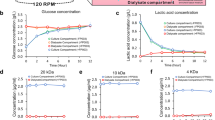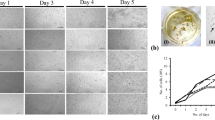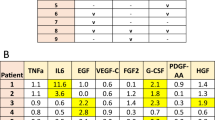Abstract
CHEMICAL1 or viral2 transformation of fibroblasts in tissue culture results in cell variants with different properties from the original cells (see ref. 2 for review). These properties include morphological changes, surface alterations3 and an increased growth ability under various conditions. This changed pattern in growth control of many transformed cells is manifested in vitro by their ability to grow in agar, to attain higher saturation densities in monolayer cultures and to be much less responsive to inhibition of cell multiplication by serum limitation4,5. In addition, different fractions of serum stimulate the growth of untransformed mouse 3T3 fibroblasts and 3T3 cells transformed by SV40 (SV3T3) in culture6 which suggests the involvement of different growth promoting molecules for normal and transformed cells. It has been shown that a new pituitary hormone, fibroblast growth factor7 (FGF), with a glucocorticoid, hydrocortisone, and with a nonspecific carrier protein could completely replace exogenously added serum for the induction of the complete mitogenic response in lines of BALB/c 3T3 cells7, whereas virtually no effects were observed on virally transformed cells (P. S. R., W. S. and D. G.; manuscript in preparation). In the presence of serum exhausted for its growth-initiating ability only FGF was required to initiate or increase DNA synthesis and cell division; the hydrocortisone concentration present in serum was considered to be sufficiently high not to require further addition7. We have now investigated the ability of FGF to promote the growth of cell mutants of BALB/c 3T3 which show temperature dependent changes in many properties characteristic of the transformed state (W. E., manuscript in preparation). We found that FGF initiates DNA synthesis and cell multiplication only at the non-permissive temperatures (‘normal’ state) but fails to initiate or promote cell growth at permissive temperatures (transformed state).
This is a preview of subscription content, access via your institution
Access options
Subscribe to this journal
Receive 51 print issues and online access
$199.00 per year
only $3.90 per issue
Buy this article
- Purchase on SpringerLink
- Instant access to full article PDF
Prices may be subject to local taxes which are calculated during checkout
Similar content being viewed by others
References
Mondal, S., and Heidelberger, C., Proc. natn. Acad. Sci. U.S.A., 65, 219–225 (1970).
Dulbecco, R., Science, 166, 962–968 (1969).
Burger, M., Proc. natn. Acad. Sci. U.S.A., 62, 994–1001 (1969).
Holley, R. W., and Kiernan, J., Proc. natn. Acad. Sci. U.S.A., 60, 300–304 (1968).
Dulbecco, R., Nature, 227, 802–806 (1970).
Paul, D., Lipton, A., and Klinger, I., Proc. natn. Acad. Sci. U.S.A., 68, 645–648 (1971).
Gospodarowicz, D., Nature, 240, 123–127 (1974).
Renger, H. C., and Basilico, C., Proc. natn. Acad. Sci. U.S.A., 69, 109–114 (1972).
DiMayorca, G., Greenblatt, M., Trauthen, T., Soller, A., and Giordano, R., Proc. natn. Acad. Sci. U.S.A., 40, 46–49 (1973).
Dulbecco, R., and Eckhart, W., Proc. natn. Acad. Sci. U.S.A., 67, 1775–1781 (1970).
Seifert, W., and Rudland, P. S., Nature, 248, 138–140 (1974).
Temin, H. M., J. cell. Physiol., 69, 377–384 (1967).
Vaheri, A., Ruoslahti, E., Hovi, T., and Nordling, S., J. cell. Physiol., 81, 355–364 (1973).
Robison, G. A., Butcher, R. W., and Sutherland, E. W., in Cyclic AMP, 22–29 (Academic Press, New York, 1971).
Aaronson, S. A., and Todaro, G. J., J. cell. Physiol., 74, 141–148 (1968).
Rudland, P. S., Proc. natn. Acad. Sci. U.S.A. 71, 750–754 (1974).
Author information
Authors and Affiliations
Rights and permissions
About this article
Cite this article
RUDLAND, P., ECKHART, W., GOSPODAROWICZ, D. et al. Cell transformation mutants are not susceptible to growth activation by fibroblast growth factor at permissive temperatures. Nature 250, 337–339 (1974). https://doi.org/10.1038/250337a0
Received:
Issue date:
DOI: https://doi.org/10.1038/250337a0
This article is cited by
-
Modulation of mammalian cell growth by a choline analog,N-isopropylethanolamine
In Vitro (1982)
-
Implications of reiterative DNA—Metal ion complexes in the induction and development of neoplastic cells
Biological Trace Element Research (1979)
-
Factors involved in the modulation of cell proliferation in vivo and in vitro: The role of fibroblast and epidermal growth factors in the proliferative response of mammalian cells
In Vitro (1978)
-
Retransformation of a thermosensitive BALB/c–3T3 transformant by murine sarcoma virus at the non-permissive temperature
Nature (1976)
-
Control of growth of mammalian cells in cell culture
Nature (1975)



